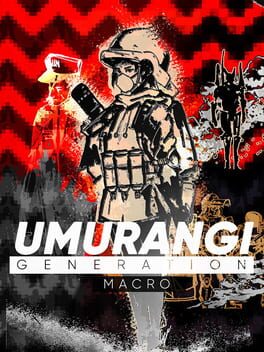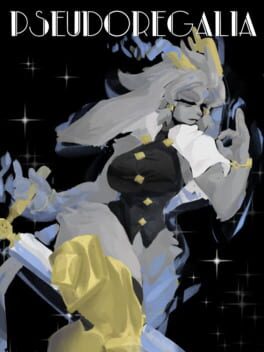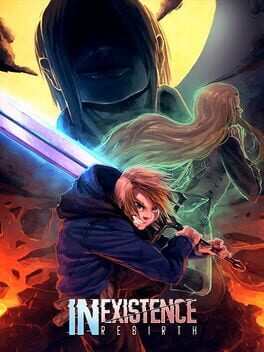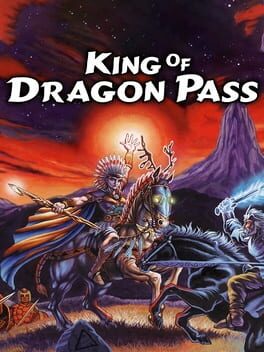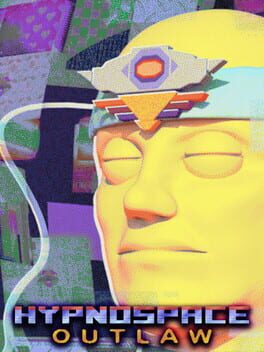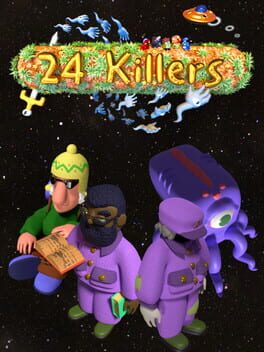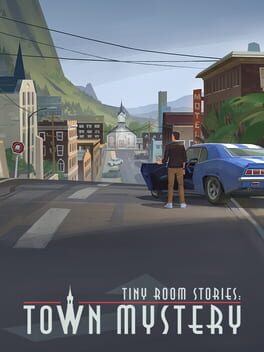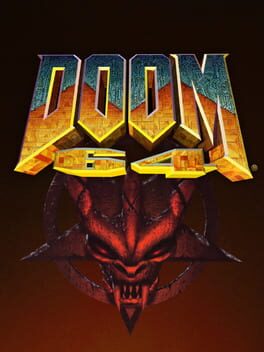oolongstains
47 reviews liked by oolongstains
Pseudoregalia
2023
Very fun game, my only complaints are the lack of an indicator in the map (which was added just after I bought the game, so it could've been worse), the relatively short length and content, and being completely lost for most of the game.
The game is also incredibly easy to break progression in, by design. It's not a bad thing, but I spent too much time getting to places I wasn't supposed to way sooner than intended.
12th game cleared in 2024. Time to clear: 7 hours or so. No achievevements. Chairs sat on: All of them.
The game is also incredibly easy to break progression in, by design. It's not a bad thing, but I spent too much time getting to places I wasn't supposed to way sooner than intended.
12th game cleared in 2024. Time to clear: 7 hours or so. No achievevements. Chairs sat on: All of them.
Inexistence Rebirth
2020
A somewhat janky Metroidvania with weird controls, decent GBA-like art, and quite possibly one of the absolute WORST game endings I've ever had to experience. Utterly horrid, edgy garbage that implies something horrible is going on. And there's no resolution to it. It just ends.
4th game cleared in 2024. Time to clear: 3.8 Hours according to Steam. 11/13 achievements obtained. Questions about the creator's mental state raised: Too many.
4th game cleared in 2024. Time to clear: 3.8 Hours according to Steam. 11/13 achievements obtained. Questions about the creator's mental state raised: Too many.
Pseudoregalia
2023
"If it feels like you're suffering, you're probably missing a movement item," my friend Aura tells me as I throw myself against a nearly-impossible platforming section. "Oh, I know," I reply, "but what if I can do it anyway?" And, dear reader, I could.
If you play Pseduoregalia and unlock every movement mechanic in the expected order and solve every puzzle using the intended solution, you are experiencing a fundamentally different game than I. To me, this is a game of getting away with something, piecing together the tools you have on hand to sneak through challenges designed for different tools and steal rewards meant for another you in another time. The movement is so deep and so powerful once you push it to its limits that you can go almost anywhere with only a few mechanics.
This makes me wonder: why are there so few 3D games that really focus in on the technical complexity of motion in 3D space? Where is the evolutionary branch of 3D platformers that zoomed in on the platforming instead of the world around it? Did I miss them, or does Pseudoregalia really stand alone?
One thing's for sure: this is going to have the absolute sickest low% speedruns you've ever seen.
If you play Pseduoregalia and unlock every movement mechanic in the expected order and solve every puzzle using the intended solution, you are experiencing a fundamentally different game than I. To me, this is a game of getting away with something, piecing together the tools you have on hand to sneak through challenges designed for different tools and steal rewards meant for another you in another time. The movement is so deep and so powerful once you push it to its limits that you can go almost anywhere with only a few mechanics.
This makes me wonder: why are there so few 3D games that really focus in on the technical complexity of motion in 3D space? Where is the evolutionary branch of 3D platformers that zoomed in on the platforming instead of the world around it? Did I miss them, or does Pseudoregalia really stand alone?
One thing's for sure: this is going to have the absolute sickest low% speedruns you've ever seen.
King of Dragon Pass
1999
King of Dragon Pass is that rare pleasure, a game that feels fresh and almost totally unique 25 years later. From a high level, it sounds like a strategy game crossed with an RPG: using a simple menu-based interface, you must lead your clan to prosperity over the course of decades, managing your people’s wealth, happiness, and relationships with your gods and other clans. Several times a year, you’re faced with a narrative event that requires you to make a decision as clan leader. Along the way, you’re helped by a group of clan nobles who offer advice and guidance.
But where most other games treat culture as something intrinsically narrative, in KoDP, culture is gameplay. Set in the rich fantasy world of Glorantha, every single one of the game’s systems is governed by the laws, customs, traditions, history and religion of your people, the Orlanthi. It’s a complex harmony of gameplay and worldbuilding where learning the game means learning about Orlanthi culture and fully inhabiting your role as a clan chieftain. In so doing it carves out its own genre, cultural roleplaying. It’s practically a crime that this game was such a commercial failure on release and has exerted such little influence on video games as a whole.
But where most other games treat culture as something intrinsically narrative, in KoDP, culture is gameplay. Set in the rich fantasy world of Glorantha, every single one of the game’s systems is governed by the laws, customs, traditions, history and religion of your people, the Orlanthi. It’s a complex harmony of gameplay and worldbuilding where learning the game means learning about Orlanthi culture and fully inhabiting your role as a clan chieftain. In so doing it carves out its own genre, cultural roleplaying. It’s practically a crime that this game was such a commercial failure on release and has exerted such little influence on video games as a whole.
Hypnospace Outlaw
2019
An epistolary narrative assembled from Geocities pages, Hypnospace Outlaw could have easily slipped into twee Web 1.0 nostalgia or punched down on the collection of weirdos and outcasts who populate its alternate reality version of the 90s web. But somehow, miraculously, it creates a fully realized and lived-in world of surprisingly multi-layered characters whose flaws and eccentricities are often humorous but more often endearing. There are some fairly easy to spot influences: Michel Gondry’s blend of technology and magical realism and the lo-fi surreality of Tim & Eric immediately spring to mind. Yet this brand of storytelling and writing still feels utterly unique. There is nothing else out there that approximates the Hypnospace Outlaw vibe.
An embarrassment of riches is hiding in plain sight, from emotionally wrenching chat logs saved in text files to pitch-perfect parodies of musical genres ranging from nu-metal to kosmische. The kind of petty dramas familiar to anyone who frequented message boards in the 90s bubble up from passive-aggressive snipes to full-on flame wars in delightfully absurd ways. Jokes layer on top of jokes layer on top of heartbreak. And it all feels genuine, because the writers have affection not just for the era but for the characters.
The gameplay has obvious influences from hidden object games, as well as the keyword-driven search of Her Story and the meta trickery of Cliff Johnson’s works such as The Fool’s Errand. While there are a few clever “a-ha!” moments, hunting for the next MacGuffin to advance the story can occasionally become a chore. This almost would have been better with mechanics stripped out in favor of presenting a pure interactive narrative. But this is a minor gripe in the face of brilliance. Hypnospace Outlaw accomplishes the rarest of feats: It got me invested in its world. I cannot wait to play Slayers X and (hopefully!) Dreamsettler soon.
An embarrassment of riches is hiding in plain sight, from emotionally wrenching chat logs saved in text files to pitch-perfect parodies of musical genres ranging from nu-metal to kosmische. The kind of petty dramas familiar to anyone who frequented message boards in the 90s bubble up from passive-aggressive snipes to full-on flame wars in delightfully absurd ways. Jokes layer on top of jokes layer on top of heartbreak. And it all feels genuine, because the writers have affection not just for the era but for the characters.
The gameplay has obvious influences from hidden object games, as well as the keyword-driven search of Her Story and the meta trickery of Cliff Johnson’s works such as The Fool’s Errand. While there are a few clever “a-ha!” moments, hunting for the next MacGuffin to advance the story can occasionally become a chore. This almost would have been better with mechanics stripped out in favor of presenting a pure interactive narrative. But this is a minor gripe in the face of brilliance. Hypnospace Outlaw accomplishes the rarest of feats: It got me invested in its world. I cannot wait to play Slayers X and (hopefully!) Dreamsettler soon.
24 Killers
2023
HEY do you like MOON?! do you like CHULIP or CHIBI-ROBO?! Do you like QUIRKY and WEIRD and HEARTFELT?! Play 24 Killers!
It's super easy to look at 24K and just call it "indie 2023 Moon Rpg" and write it off. However, I think this game uses this very obvious love-de-lic inspiration and creates something new that can stand on it's own legs.
Everything in 24 Killers feels dreamlike. From the music, to the art, the dialogue, and even the dream-logic of the world and puzzles. But 24k never feels "lul random xD" because the game has a very stable internal logic.
The very opening moments of the game are bizarre but setup consistent world-building and character moments. We learn about Johnny Puzzle (the puzzle and contraption-loving dog), Mole (a giant friendly mole), Moon (some sort of extraterrestrial being calling the shots), and finally the player character Home.
Home is an echo. You don't really know what an echo is at the start, but you know it's a hand with an eyeball on it and a little wiggly tail. And you dive right into the corpse of a soldier. Home doesn't like this and wants to get away from all these annoying monsters ("mons" in the game's lingo) and starts to fight off all of them before Moon knocks them out.
Usually in love-de-lic games and other "cozy" games like this, the player character is nice, but Home is kind of a jerk! And that's what makes this game so nice to play. Seeing how Home reacts to the shenanigans, seeing how they grow and learn. Helping uncover this mystery. Diving into the bizarre dream-logic world and trying to genuinely help these people. When the sentient spider-mocha pot tells you that it's depressed and lost in life because the coffee plant outside is dried up and dead, it's not a random joke but a problem that you want to solve.
24 Killers isn't a very long game. That's a plus for me, I'm an adult with little time. I completed the game in about 8 hours and there is some.... very interesting replay incentives, but I can see that being a turn-off for some folks.
I adore this game and I want more like it. Games like this inspire me. To be more creative, to be more honest, to be more genuine, to be more weird, to love myself and others more. It's a beautiful game.
It's super easy to look at 24K and just call it "indie 2023 Moon Rpg" and write it off. However, I think this game uses this very obvious love-de-lic inspiration and creates something new that can stand on it's own legs.
Everything in 24 Killers feels dreamlike. From the music, to the art, the dialogue, and even the dream-logic of the world and puzzles. But 24k never feels "lul random xD" because the game has a very stable internal logic.
The very opening moments of the game are bizarre but setup consistent world-building and character moments. We learn about Johnny Puzzle (the puzzle and contraption-loving dog), Mole (a giant friendly mole), Moon (some sort of extraterrestrial being calling the shots), and finally the player character Home.
Home is an echo. You don't really know what an echo is at the start, but you know it's a hand with an eyeball on it and a little wiggly tail. And you dive right into the corpse of a soldier. Home doesn't like this and wants to get away from all these annoying monsters ("mons" in the game's lingo) and starts to fight off all of them before Moon knocks them out.
Usually in love-de-lic games and other "cozy" games like this, the player character is nice, but Home is kind of a jerk! And that's what makes this game so nice to play. Seeing how Home reacts to the shenanigans, seeing how they grow and learn. Helping uncover this mystery. Diving into the bizarre dream-logic world and trying to genuinely help these people. When the sentient spider-mocha pot tells you that it's depressed and lost in life because the coffee plant outside is dried up and dead, it's not a random joke but a problem that you want to solve.
24 Killers isn't a very long game. That's a plus for me, I'm an adult with little time. I completed the game in about 8 hours and there is some.... very interesting replay incentives, but I can see that being a turn-off for some folks.
I adore this game and I want more like it. Games like this inspire me. To be more creative, to be more honest, to be more genuine, to be more weird, to love myself and others more. It's a beautiful game.
There's just nothing at all here. The writing is dull, sparse, and terribly translated, the puzzles are bog standard escape room fare, and the concept of a "mystery" isn't sold at all by either the narrative or mechanical design. The description suggests that this is supposed to have a "miniatures" vibe to it, but it just comes off as unremarkable low-poly asset pack instead. Charmless and empty.
Doom 64
2020
What a brilliant mess this game is. Breath of the Wild, when it came out, felt like a flawless jewel. You could complain (and I did!) about how weapon durability disincentivized engaging with the combat, or bemoan the relative weakness of the dungeons, but those were all gripes around the edges of the monumental fact that they had near-perfectly delivered on the promise that open world games had been making for decades. It was reacting to the larger world of video games in a way Nintendo largely refused to do, and at the same time it was like nothing we'd seen before.
Tears of the Kingdom is very much like something we've seen before. The core conceit is identical to its predecessor despite the different array of magical abilities, and even the plot is largely unchanged: Zelda is gone, again. The great evil is back, again. Climb the towers, find the shrines, do the dungeons, save the princess.
But to see this as just more Breath of the Wild is also to miss the point. The first game was constrained by its immaculate crystalline structure. It had to be the open-world game. Tears of the Kingdom could never be that because that's already been done, and it uses the extra freedom of the younger sibling to get weird with it.
In a lot of ways, this weirdness isn't for the best. The control scheme is onerous to say the least, particularly when engaging with the construction mechanics. The combat scaling is way off, with enemies either taking ten hits from a top-tier weapon or dying immediately. Once you get a feel for the patterns in the depths, they're largely empty and repetitive.
But damn if it isn't also interesting. The truth I keep coming back to is this: although I think Breath of the Wild is a "better" game in some abstract design sense, I lost interest after about 100 hours. Meanwhile, I've spent twice that playing Tears of the Kingdom and I'd be happy to continue if only there weren't more games to get around to.
This game takes huge swings, and while not all of them hit the ones that do are incredible. You only have to glance online to see the videos of mechs and drones players have built. The depths feel genuinely terrifying. Fusion is fully brilliant, simultaneously solving durability and making room for countless moments of discovery. There are genuinely good boss fights for maybe the first time in any Zelda game.
And I could rhapsodize endlessly about the way the world interconnects with itself. To my mind, the only real justification for the concept of "open world" is the idea that your actions as a player have non-local effects on the world you exist in. Breath of the Wild gestured at this, but Tears of the Kingdom fully embraces it. Conversations continue across the map from one another as NPCs wander from place to place. Refugees you meet in one region return home to another as you rebuild their houses. The world feels alive in a way that games seldom attempt and almost never achieve, and I love it for that.
Tears of the Kingdom is very much like something we've seen before. The core conceit is identical to its predecessor despite the different array of magical abilities, and even the plot is largely unchanged: Zelda is gone, again. The great evil is back, again. Climb the towers, find the shrines, do the dungeons, save the princess.
But to see this as just more Breath of the Wild is also to miss the point. The first game was constrained by its immaculate crystalline structure. It had to be the open-world game. Tears of the Kingdom could never be that because that's already been done, and it uses the extra freedom of the younger sibling to get weird with it.
In a lot of ways, this weirdness isn't for the best. The control scheme is onerous to say the least, particularly when engaging with the construction mechanics. The combat scaling is way off, with enemies either taking ten hits from a top-tier weapon or dying immediately. Once you get a feel for the patterns in the depths, they're largely empty and repetitive.
But damn if it isn't also interesting. The truth I keep coming back to is this: although I think Breath of the Wild is a "better" game in some abstract design sense, I lost interest after about 100 hours. Meanwhile, I've spent twice that playing Tears of the Kingdom and I'd be happy to continue if only there weren't more games to get around to.
This game takes huge swings, and while not all of them hit the ones that do are incredible. You only have to glance online to see the videos of mechs and drones players have built. The depths feel genuinely terrifying. Fusion is fully brilliant, simultaneously solving durability and making room for countless moments of discovery. There are genuinely good boss fights for maybe the first time in any Zelda game.
And I could rhapsodize endlessly about the way the world interconnects with itself. To my mind, the only real justification for the concept of "open world" is the idea that your actions as a player have non-local effects on the world you exist in. Breath of the Wild gestured at this, but Tears of the Kingdom fully embraces it. Conversations continue across the map from one another as NPCs wander from place to place. Refugees you meet in one region return home to another as you rebuild their houses. The world feels alive in a way that games seldom attempt and almost never achieve, and I love it for that.
